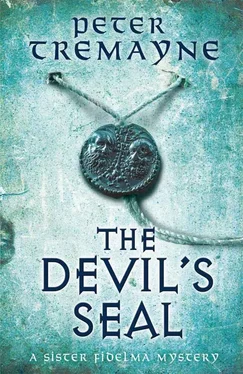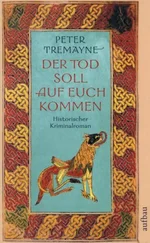Peter Tremayne - The Devil's seal
Здесь есть возможность читать онлайн «Peter Tremayne - The Devil's seal» весь текст электронной книги совершенно бесплатно (целиком полную версию без сокращений). В некоторых случаях можно слушать аудио, скачать через торрент в формате fb2 и присутствует краткое содержание. Год выпуска: 2014, ISBN: 2014, Издательство: Hachette UK, Жанр: Исторический детектив, на английском языке. Описание произведения, (предисловие) а так же отзывы посетителей доступны на портале библиотеки ЛибКат.
- Название:The Devil's seal
- Автор:
- Издательство:Hachette UK
- Жанр:
- Год:2014
- ISBN:9781472208330
- Рейтинг книги:3 / 5. Голосов: 1
-
Избранное:Добавить в избранное
- Отзывы:
-
Ваша оценка:
- 60
- 1
- 2
- 3
- 4
- 5
The Devil's seal: краткое содержание, описание и аннотация
Предлагаем к чтению аннотацию, описание, краткое содержание или предисловие (зависит от того, что написал сам автор книги «The Devil's seal»). Если вы не нашли необходимую информацию о книге — напишите в комментариях, мы постараемся отыскать её.
The Devil's seal — читать онлайн бесплатно полную книгу (весь текст) целиком
Ниже представлен текст книги, разбитый по страницам. Система сохранения места последней прочитанной страницы, позволяет с удобством читать онлайн бесплатно книгу «The Devil's seal», без необходимости каждый раз заново искать на чём Вы остановились. Поставьте закладку, и сможете в любой момент перейти на страницу, на которой закончили чтение.
Интервал:
Закладка:
Eadulf had wanted to discuss matters further. He felt irritated and nearly pointed out that he had been ready for bed some time ago. First thing in the morning, he’d be taking his son out riding. This didn’t happen often because Eadulf was not fond of riding as a pastime, unlike Fidelma. He rode only when he was forced to do so, as a means of transport. The idea that one rode a horse for pleasure was beyond his comprehension.
‘Very well,’ he said stiffly, as he followed Fidelma’s example. ‘We will talk more about this in the morning. But as you said earlier, there will be little time to reach any solution before Bishop Arwald and his party arrives. I do not think we have to fear Bishop Arwald, however. It is the fact that he is accompanied by the Venerable Verax, brother of the Bishop of Rome, which gives me concern.’
They wished Brother Conchobhar good night and left him to his studies. It was as they were entering their chamber that Eadulf suddenly asked: ‘Do you believe what Brother Conchobhar was saying about Brother Madagan?’
Fidelma stared at her husband in surprise. ‘I have never known him to lie. Is there a reason why we should disbelieve him now?’
‘I find it curious that he comes out with this suspicion about Brother Madagan killing Brother Cerdic at the very moment that he learns that his own nephew has been imprisoned as a suspect.’
CHAPTER ELEVEN
The morning was dry and the dark stormclouds had vanished, but with the clear blue skies had come a cold and chilly wind whipping across the plains from the north-east. Eadulf felt exhausted already; he had barely slept. But a promise to his son was a promise — and he felt the guilt of too many times when he had followed Fidelma on missions that had taken them to many distant places, so that they had barely seen the early months and years of their son’s growth to boyhood.
At least the cold breath of the wind seemed to be easing his throbbing headache. He rode awkwardly on his sturdy cob, just in front of Alchú who followed on his small pony. Even at his young age the boy seemed totally at ease on his mount; the master of the animal. Eadulf envied him. Beside the boy came the watchful Luan, one of the King’s warriors. Knowing Eadulf’s limitations as an equestrian, Fidelma always insisted that Alchú be accompanied by one of her brother’s bodyguards.
Eadulf had chosen the easy path from Colgu’s fortress palace, moving south via a track that led through the forest that spread before them. Tall yews, birch and elm predominated among the trees. Apart from the evergreens, the forest still had its gaunt and withered winter look, although here and there along the track were clumps of snowdrops, whose appearance usually foretold the end of winter. Now and then they mingled with the small white flowers of lus an sparáin , rising from their sprawling green leafy growth. What was it he had learned about those flowers while studying the art of apothecary? The juice of the flower dropped into the ear would ease earache and pain. He tried to remember what the plant was called in his own language — Shepherd’s something? He gave up almost immediately. There was evidence of the gorse preparing for the day when it would burst into bright yellow flowers, but that day was several weeks away yet.
From the thickets he could hear the ‘tit-tit-tit’ explosive cry of the tiny and inconspicuous wren, and glimpse it briefly before it fell silent while a songthrush with its white speckled belly suddenly darted from one patch of undergrowth to another. Then the sudden silence, the abrupt quietness of the birds, caused him to look around for a reason. Not far away was a solitary bird of ill-omen — the black raven — but that was a scavenger and certainly not enough to threaten the small active birds. Then he caught sight of a pair of kestrels hovering in the sky above the path. There was the female, with her rusty brown-coloured tail, and the long pointed wings of the male, with chestnut-coloured back and grey tail with black band. No wonder the smaller birds had fallen silent, for the kestrels were deadly hunters — birds of prey. The black raven was waiting for the kestrels to make their kill and then, when they had fed, it would pick up what was left.
Eadulf shuddered, reminding himself that it was a cruel world and, try as he might to disassociate himself from the idea, man was part of it. Man could be just as cruel and unforgiving as the hovering kestrels, watching for a tiny wren or songthrush to make a mistake and then-
He glanced behind him and saw the grinning face of little Alchú, staring innocently up at the birds above him. He wondered whether the boy would ever see them as he did: recognise this scene for the unforgiving cruelty that it demonstrated. Or did he see it as simply a ride among the whispering trees, lit by a pale sun?
Eadulf did not intend to ride a long way; perhaps as far as Rath na Drinne where Ferloga and his wife Lassar ran an inn. He and Fidelma had often halted there. It was close by an ancient enclosure, converted into a fortified farm. Its name meant ‘Fort of Contentions’. Ferloga had once told him that in ancient times it had been so called because it was there that great contests were held. Contests like immán or camán , with players driving a ball with sticks of ash, over the grassy field, trying to get the ball between two poles. Then there were athletic contests, foot racing, wrestling and disc throwing.
It was just beyond Rath na Drinne that the forest eventually ended on the edge of an extensive grassy plain — the Plain of Femen which reached all the way to the Field of Honey by the side of the River Siúr. It was why the Eóghanacht, centuries before, had chosen their capital overlooking the plain controlling the wealth and security of the kingdom. To the south-west on the horizon rose the Sliabh na gCoillte, the Forest Mountains, and among them the strange waters of the Lake of the Dragon’s Mouth. It was here that the old God of Love, Aonghus Óg, found the tall maiden, Cáer, whom he had sought because she had appeared to him in a dream. On declaring their love, the pair had transformed into swans, circling the lake symbolically three times before disappearing off to the Land of Enchantment. Eadulf smiled. He had heard these tales many times from the old storytellers in Cashel. They were the legends of Fidelma’s people — her ancestors.
Then the smile dropped from his face. Fidelma’s people? Not his. He was suddenly aware of what his brother, Egric, had said. Was he simply a stranger in a strange land; a land in which he didn’t belong? Why was he questioning himself after all these years? Had he deluded himself that he had been accepted into this new culture? Was it his brother’s comments that had disturbed him? Or was it old Brehon Aillín’s prejudice? Indeed, was it the newfound prejudice of Brother Madagan. . Had people simply been tolerating him, smiling to his face and viewing him with dislike behind his back? Eadulf swallowed hard. This was not right, this stream of dark thoughts.
Everything had been peaceful until Egric appeared and started to question his motives. What right had Egric to do so? He had made his own life. The brothers had taken separate paths. Why had he emerged now, at such a time and at this place? He had appeared abruptly at Cashel and now, even more abruptly, had vanished on a hunting trip with Dego. Gone without taking leave; without a word of warning. It was curious. Eadulf trusted Dego. The warrior had accompanied Fidelma and himself on numerous trips; they had shared many dangers. Dego was reliable. Surely Dego respected Eadulf? He would not dismiss him as a stranger of no importance. He would never have been persuaded to take Egric hunting without being assured that Eadulf was aware of the trip. Ah, now those bleak thoughts came over him like a flood. Was he deluding himself that this was his home or. . It was surely Egric who had conjured these cheerless, negative thoughts into his mind!
Читать дальшеИнтервал:
Закладка:
Похожие книги на «The Devil's seal»
Представляем Вашему вниманию похожие книги на «The Devil's seal» списком для выбора. Мы отобрали схожую по названию и смыслу литературу в надежде предоставить читателям больше вариантов отыскать новые, интересные, ещё непрочитанные произведения.
Обсуждение, отзывы о книге «The Devil's seal» и просто собственные мнения читателей. Оставьте ваши комментарии, напишите, что Вы думаете о произведении, его смысле или главных героях. Укажите что конкретно понравилось, а что нет, и почему Вы так считаете.











